Related Research Articles

Awadh, known in British historical texts as Avadh or Oudh, is a region and proposed state in the modern Indian state of Uttar Pradesh, which was before independence known as the United Provinces of Agra and Oudh. Awadh is bounded by the Ganges Doab to the southwest, Rohilkhand to the northwest, Nepal to the north, and Bhojpur-Purvanchal to the east. Its inhabitants are referred to as Awadhis.

Islamia College Peshawar (ICP) is a public university located in Peshawar, Khyber Pakhtunkhwa, Pakistan.
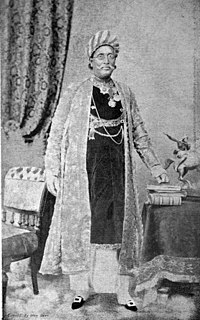
Nawab Bahadur Abdul Latif was a 19th-century Bengali aristocrat, educator and social worker. His title, Nawab was awarded by the British in 1880. He was one of the first Muslims in 19th-century India to embrace the idea of modernisation.
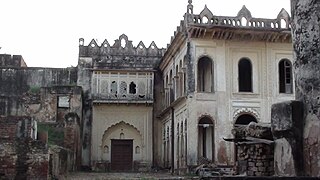
Chhatari is a Town in Bulandshahr district in the state of Uttar Pradesh, India.
Pahasu is a town and a nagar panchayat in Bulandshahr district in the Indian state of Uttar Pradesh.
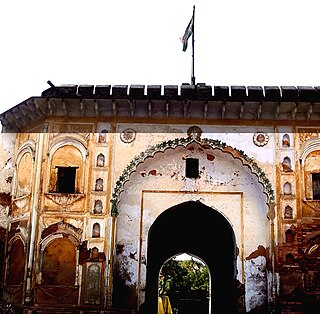
Sadabad is a town and a nagar panchayat in Hathras district in the Indian state of Uttar Pradesh.
The All India Muhammadan Educational Conference was an organisation promoting modern, liberal education for the Muslim community in India. It was founded by Sir Syed Ahmed Khan, also the founder of the Aligarh Muslim University. All India Mumammadan Educational Conference was the origin of the All-India Muslim League. The Muslim League was born in the 20th session of All India Muhammadan Educational Conference, which was established by Syed Ahmed Khan in Aligarh in 1886. Muhammadan Educational Conference used to hold its annual meetings in various cities where, by the co-operation of local Muslims, steps were taken for the progress of education.
The Scientific Society of Aligarh was a literary society founded by Sir Syed Ahmad Khan at Aligarh. The main objectives of the society was to translate Western works on arts and science into vernacular languages and promote western education among the masses.

Lieutenant Colonel Saeed ul-Mulk Nawab Sir Muhammad Ahmad Said Khan, Nawab of Chhatari also generally referred to as Nawab of Chhatari was Governor of the United Provinces, Chief Minister of United Provinces, President of the Executive Council of the Nizam of Hyderabad and Chief Scout of India.
The Lalkhani are a Muslim Rajput community, found in North India. They are a sub-division of the Bargujar clan of Rajputs, who converted to become Muslims. The community is found mainly in the districts of Aligarh Bulandshahr They are called Lalkhani Which does not apply to all Muslim Bargujar, as those originally from Haryana.
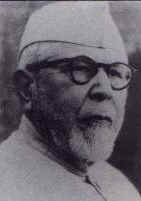
Abdul Majeed Khwaja was an Indian lawyer, educationist, social reformer and freedom fighter from Aligarh. In 1920, he along with others founded Jamia Millia Islamia and later served its vice chancellor and chancellor.
Qāḍī Sayyid Rāfiʿ Muḥammad Dasondhi was a scholar of repute from Sakras, District Gurgaon. He belonged to the family of Gardēzī Sadaat.
General elections were held in British India in September 1930. They were boycotted by the Indian National Congress and marked by public apathy. The newly elected Central Legislative Assembly met for the first time on 14 January 1931.
Nawab Abdul Samad Khan Bahadur (1861–1943) was the Nawab of Chhatari and Nawab of Talibnagar in the United Provinces of Agra and Oudh. He belonged to the Lalkhani family of Muslim Rajputs.
Maharaja Sir Mohammad Ali Mohammad Khan, Khan Bahadur, KCSI, KCIE was the Raja of Mahmudabad from 28 June 1903 to 23 March 1931 and a noted politician, zamindar of British India.

Nawab Sir Muhammad Muzammilullah Khan Sherwani, Khan Bahadur (1865–1935) was a noted zamindar and politician from the United Province of British India.
Raja Mir Syed Muhammad Baquar Ali Khan Bahadur (1842–1902) C.I.E., The Mir of Kotaha and the Raja of Morni and Pindrawal, was a noted zamindar and philanthropist from Morni who lived in Pindrawal in United Province of British India.
The Aligarh Movement was the push to establish a modern system of Western–style scientific education for the Muslim population of British India, during the later decades of the 19th century. The movement's name derives from the fact that its core and origins lay in the city of Aligarh in Northern India and, in particular, with the foundation of the Muhammadan Anglo-Oriental College in 1875. The founder of the oriental college, and the other educational institutions that developed from it, was Sir Syed Ahmed Khan. He became the leading light of the wider Aligarh Movement.
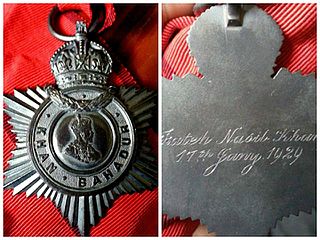
Khan Bahadur – a compound of khan (leader) and bahadur (brave) – was a formal title of respect and honor, which was conferred exclusively on Muslim and other non-Hindu natives of British India. It was one degree higher than the title of Khan Sahib.
The Bhikampur and Datawali principality is in Aligarh, Uttar Pradesh. For nearly four centuries, before the advent of British Raj in India, it was ruled by the descendants of a Sherwani Pathan from Jalalabad in Afghanistan. The Sherwani clan were practically independent rulers in the period between the collapse of Mughal Empire and the rise of the British Raj.
References
- ↑ Selected documents from the Aligarh archives, Volume 1. Published for the Dept. of History, Aligarh Muslim University [by] Asia Pub. House, 1967. 1967.
- ↑ "Second supplement to Who's who in India [microform] : Brought up to 1914". 1914.
- ↑ Robinson, Francis (3 December 2007). Separatism Among Indian Muslims: The Politics of the United Provinces ... By Francis Robinson. ISBN 9780521048262.